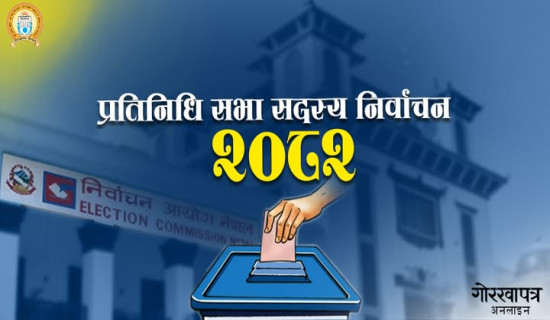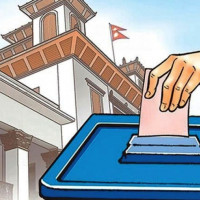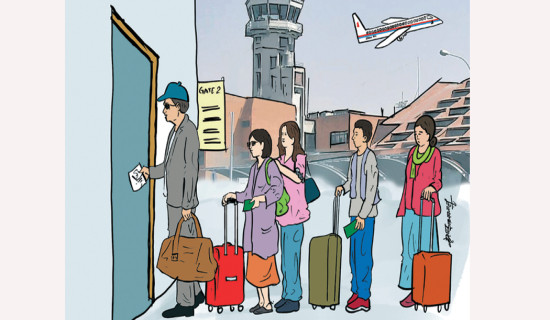- Thursday, 26 February 2026
Cooperative fraud swells in Nepal
Kathmandu, Feb. 23: In absence of well-structured laws and regulations concerning cooperatives, there is still no certainty about the recovery of nearly Rs. 275 billion defrauded from cooperative victims.
The government, aiming to address issues in the cooperative sector and ensure the refund of the victims' money, has recently established the National Cooperatives Regulatory Authority, which came into operation from January 27, 2025 pursuant to an ordinance.
However, even a month after its establishment, the authority has yet to provide any concrete information on how and when the victims will get their money back.
Although the Authority has been formed through an ordinance, signaling the government's attempt to regulate the cooperative sector in the future, victims and stakeholders remain concerned as there is still no guarantee of recovering the Rs. 275 billion deposited in troubled cooperatives in the past.
Former Secretary at the Ministry of Land Management, Cooperatives, and Poverty Alleviation Gopinath Mainali said that although the government has attempted to reform the cooperative sector through an ordinance and establishment of the Authority, it has failed to immediately address the problems faced by affected depositors.
“The Authority formed through the ordinance aims to address some cooperative-related issues,” Mainali said, “but it should have ensured the return of small deposits (up to five lakh rupees), which is not seen today.”
He further pointed out that despite the government budget for the current fiscal year mentioning the return of deposits up to Rs. 500,000, the ordinance does not provide a guarantee for depositors' refunds. “There is no assurance that cooperative victims will get their deposits back immediately,” he said. “However, provisions such as the formation of an authority are positive steps.”
According to the National Campaign for Cooperative Depositors' Protection (Federation), approximately Rs. 275 billion is at risk in more than 357 cooperatives across the country. A special parliamentary investigation committee, formed by the government to probe financial irregularities in cooperatives, reported that 40 cooperatives -- including 22 troubled ones and 18 publicly questioned institutions -- have a total liability of Rs. 87.89 billion, with savings deposits amounting to Rs. 71.30 billion.
Given that these 40 cooperatives alone account for nearly Rs. 275 billion in deposits at risk, it looks like that the total deposits under threat nationwide are significantly higher.
Kushalabh KC, President of the National Campaign for Cooperative Depositors' Protection (Federation), said that although the ordinance was expected to introduce policy measures for deposit refunds, it has failed to effectively address the issue. "We are now expecting some special addresses from the newly established National Cooperatives Regulatory Authority (NCRA) to ensure refund of small deposits up to Rs. 500,000 and similar policies regarding deposits above Rs. 500,000," said KC.
According to former secretary Mainali, the problem in cooperatives arose due to lack of effective regulation and monitoring. Cooperative institutions operated against their core values and principles. They invested arbitrarily in houses, land, shares, hydropower, and other sectors, and when they failed, they were unable to return depositors' savings.
According to National Cooperative Federation of Nepal Ltd. (NCF), currently, there are 31,373 cooperatives across the country. These cooperatives have 7.4 million depositors and 2.3 million borrowers.
Reasons behind irregularities
According to a report published by the Parliamentary Special Investigation Committee led by lawmaker Surya Thapa Chhetri, more than Rs. 200 billion has been mismanaged in the cooperative sector. Chandra Prasad Dhakal, president of NEFSCUN (National Federation of Savings and Credit Cooperative Unions Ltd.), attributed the problem of cooperative fraud to the government's failure in regulation, despite the fact that savings and credit cooperatives have attracted tens of thousands of depositors.
"We have implemented self-regulation within our affiliated institutions. However, there are many cooperatives with tens of thousands of members that are not linked to us. The government failed to regulate them. Had the regulatory authority been established earlier, this situation might not have arisen," he claimed.
Following recommendations from the parliamentary special committee formed to investigate the misappropriation of cooperative savings, the government has recently established a regulatory authority for cooperatives.
Similarly, chairperson of the National Cooperative Federation of Nepal Om Devi Malla believed that significant irregularities have occurred in some cooperatives because the government has only been responsible for their registration and has not focused on their regulation.
"The registration body exists, but there is no authority to monitor or supervise whether cooperatives are operating properly and conducting business ethically," she stated.
Rs. 33.321 billion defrauded; 595 arrested, 1,922 on the run
According to the records available from the Nepal Police Headquarters, cooperative depositors have been defrauded of Rs. 33.321 billion over the past three-and-a-half years (from fiscal year 2021 to first seven months of current fiscal year 2024/25).
A total of 1,922 individuals involved in cooperative fraud are currently at large, while 595 have been arrested. So far, 266 cases related to cooperative fraud have been officially registered within these years.
The highest number of cooperative irregularities was recorded in the fiscal year 2023/24, when Rs. 11.68 billion was embezzled. In this year alone, 101 cases were filed, leading to the arrest of 294 individuals, while 870 suspects remain at large.
Similarly, in FY 2022/23, cooperative fraud amounted to Rs. 11.53 billion, with 93 cases registered. That year, 553 people fled, while 208 were arrested.
In FY 2021/22, authorities registered 24 cases involving fraud worth Rs. 4.99 billion. During that period, 50 individuals were arrested, while 149 managed to escape. Police continue their search for those on the run.
Likewise, in the first seven months of the current fiscal (2024/25), 48 cooperative cases have been registered with 43 arrest and 350 absconding individuals. Within these months, police have claimed that Rs. 5.11 billion has been defrauded.
It has been reported that 89 per cent of the fraudsters are still on the run.
As police record only account for the complaints officially filed, the actual figures, including unreported frauds, could be significantly higher.
Nepal Police Central Spokesperson and DIG Dinesh Kumar Acharya said that arresting the fugitives has been challenging as some have even fled the country.
"In some cases, a Red Corner Notice has also been issued. Despite that, the concerned countries have not cooperated, making it difficult to bring them back to Nepal. There are also some legal challenges in this regard," Acharya told The Rising Nepal daily.
Investigations and legal proceedings
Cooperatives are monitored by federal, provincial, and local governments. When financial irregularities occur, depositors first file complaints with relevant regulatory bodies. These authorities attempt to mediate and recover the deposits before forwarding unresolved cases to the police for further investigation.
The police also prioritise resolving cases through settlements when possible. If mediation efforts fail, they proceed with legal action, filing cases through the District Attorney's Office and the District Court.
High and mighty in cooperative scam
Several high-ranking individuals are currently in police custody, while others remain at large. Among those implicated in the cooperative fraud scandal is Rastriya Swatantra Party (RSP) President and former Deputy Prime Minister & Home Minister Rabi Lamichhane, who was arrested, for first time, on October 18, 2024.
Fraud cases against him have been filed in Kaski, Kathmandu, and Rupandehi districts. Though he was released on bail from these courts, cases are still pending in Chitwan and Parsa districts.
As authorities continue their crackdown, efforts are underway to recover the embezzled funds and bring those responsible to justice.
GB Rai, Gyan Bahadur Bomjan, and Bhupendra Rai, who are linked to the Surya Darshan and four other cooperative fraud cases, along with Bharat Maharjan, Gyan Maya Maharjan, Sachin Maharjan, and Sharala Maharjan, who are accused of misusing savings in Sumeru Cooperative, are still hiding abroad and remain on the fugitive list.
Risk of being derailed from regular policing
Despite the increasing number of cooperative fraud cases, police records indicate that many fugitives on the list have yet to be arrested. According to former Nepal Police DIG Hemant Malla Thakuri, political reasons and the police being burdened with other daily routines have contributed to many cooperative fraud suspects remaining at large.
"Political factors are among the small reasons why many suspects are still on the run. Additionally, the police are currently overloaded with cases, not just related to cooperatives. Limited resources may have also led to lower priority being given to such cases," Malla said.
NCRA and its new role
Established on January 27, 2025 through an ordinance, National Cooperatives Regulatory Authority has now come into effect dissolving previously known National Cooperative Development Board (NCDB).
Talking on the matter, Minister for Land Management, Cooperatives, and Poverty Alleviation, Balaram Adhikari said the amendment to the Cooperative Act through an ordinance has ensured cooperative regulation under the ownership of all three levels of government—federal, provincial, and local.
He urged the public to view the government's efforts positively. He also said that since the appointment of a new chairperson will take time, the ministry has temporarily assigned the board’s responsibility to the secretary of the Cooperative Ministry to expedite the authority’s progress.
The spokesperson for the National Cooperatives Regulatory Authority, Rabin Dhakal, said that a three-member task force has been formed under the coordination of Nepal Rastra Bank's Executive Director and member of the Cooperative Regulatory Authority, Guru Prasad Paudel. The task force has been established to formulate regulatory standards that need to be immediately implemented for the effective regulation and supervision of cooperative institutions involved in savings and credit transactions.
















